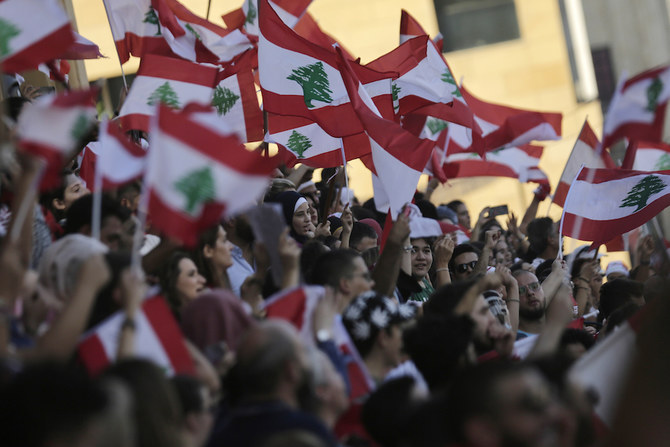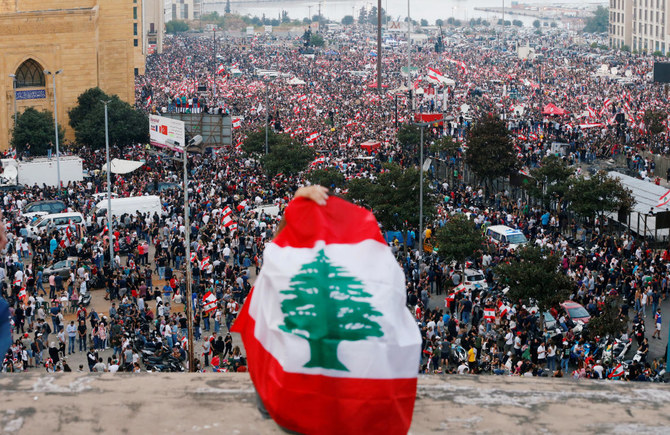BEIRUT: Lebanon’s government on Monday passed crucial economic reforms under pressure from mass demonstrations, with the prime minister saying the protests had shaken the political leadership and broken the “blind barrier of sectarian loyalty.”
Prime Minister Saad Hariri had set a Monday evening deadline for his coalition partners to agree on measures to appease angry citizens, who have been protesting since last Thursday about the country’s dire economic situation.
There will be no new personal taxes or austerity measures in next year’s budget. Hariri also said there would be early parliament elections to meet demands for political reform.
Other major concessions include salary cuts for top politicians, axing a ministry and slashing the budget of a government body.
“I took a first step, but what you did shook all the political parties and leaders, and broke the blind barrier of sectarian loyalty,” he said. “This is certainly a national demand and I hope it will be the beginning of the sectarian system’s end in Lebanon.”
HIGHLIGHTS
• Prime Minister Saad Hariri had set a Monday evening deadline for his coalition partners to agree on measures to appease angry citizens, who have been protesting since last Thursday about the country’s dire economic situation.
• Cabinet would make efforts to recover looted public funds. A national anti-corruption body would be established and there would be tougher scanning at border crossings to fight smuggling, says PM.
He made the remarks after a five-hour Cabinet meeting. He said young people in particular were “desperate, bursting, and took to the streets to express their anger and claim, in their own way, diverse and rightful demands as well as the basic demand for dignity and respect for their opinions.”
He listed some of the Cabinet session’s achievements such as a 50 percent reduction in the salaries of former and current ministers and deputies, a 70 percent budget cut for the Council for Development and Reconstruction.
There will be an additional LBP20 billion ($13.27 million) to support the poorest households’ program, with a $100 million loan from the World Bank and $160 million in housing loans.
Hariri added that the Cabinet would make efforts to recover looted public funds. A national anti-corruption body would be established and there would be tougher scanning at border crossings to fight smuggling.
The Cabinet also decided to abolish the Ministry of Information, appoint regulatory bodies for electricity, communications and civil aviation and accelerate the commissioning of electricity production plants within four months. A financial adviser would be consulted about privatizing the telecommunications sector.
“There will not be any investment spending from the budget, thus closing the door on waste and corruption. Our dependence on foreign direct investment ensures growth. These decisions may not fulfill your demands, but will fulfill what I have been demanding for two years. These decisions are not a barter to stop the protests, this is your decision to make. I do not allow anyone to threaten you and it is the state’s duty to protect you. You are the compass and your protests have led these decisions. You are out on the streets demanding your national and individual dignity, and the respect of your opinions and you must know that your voices are heard.”
The Cabinet meeting was attended by 26 ministers, except the four representatives from the Lebanese Forces Party who had resigned from the government.
The initial reaction of some protesters was that the Hariri deal was inadequate.
“We reject the suggested reforms,” activists in Riad El-Solh Square told Arab News. “How can we believe that these reforms will be executed after years of promises of reforms and none of them have been implemented?”
Protesters have flocked to sit-ins across the country, with banks and public institutions shuttered during the unrest, their anger filling the airwaves and news cycles.
Roadblocks of burning tires and sandbags have increased the sense of frustration and restiveness, with concerns about access to flour, fuel, vegetables and fruits.
The official national news agency reported that mills had supplied flour to bakeries on Sunday at midnight. “Some of the trucks were able to reach their destinations while others were unable to do so due to roadblocks,” it said.
Sami Brax, who heads the Syndicate of Gas Station Owners, appealed to protesters: “The fuel available in the stations is sufficient until Tuesday morning. There is a need to open the roads and let fuel tanks pass because gasoline and diesel are essential materials, not only for homes and cars, but also for hospitals, bakeries, electric generators, food establishments’ trucks, ambulances, and firefighters.”






























